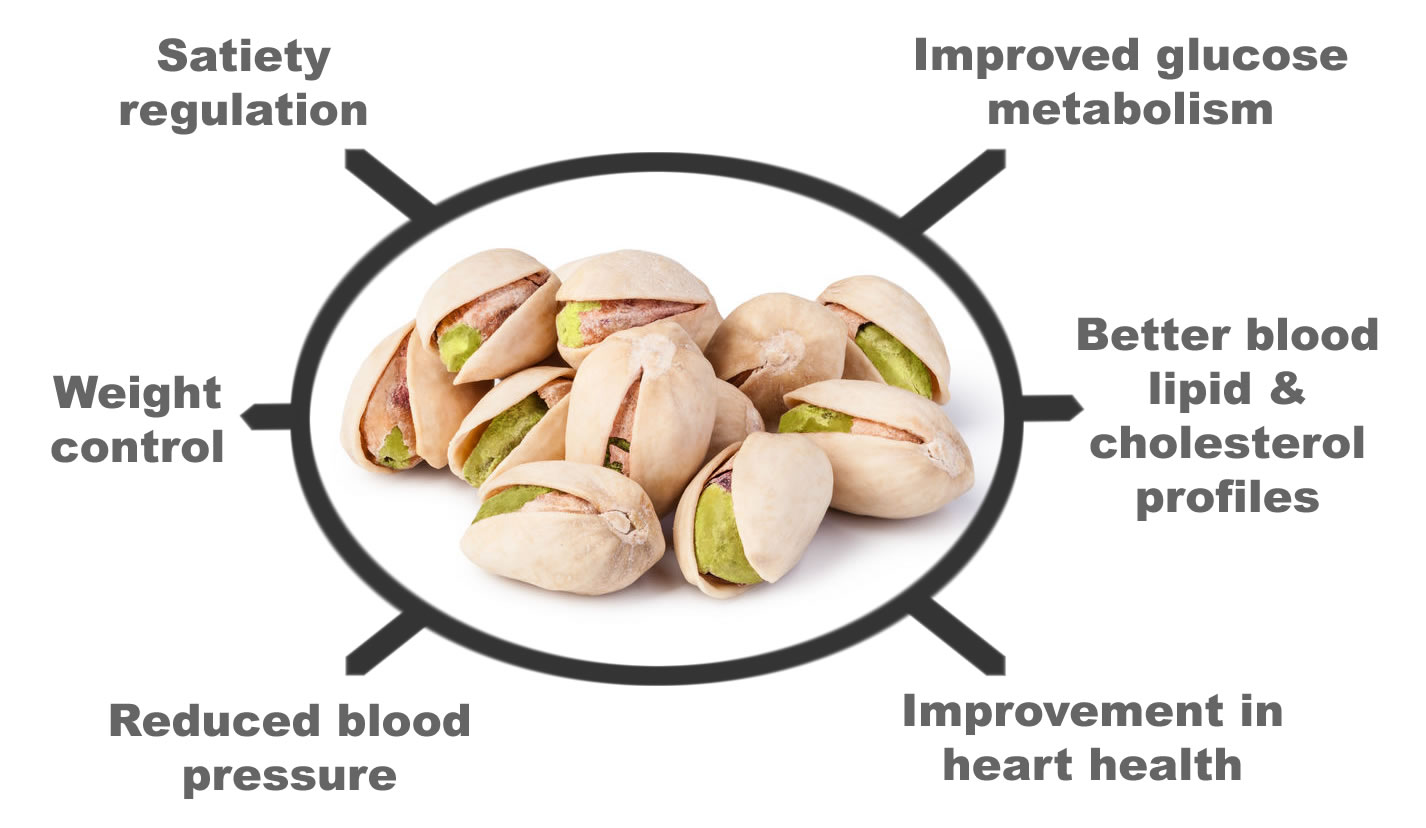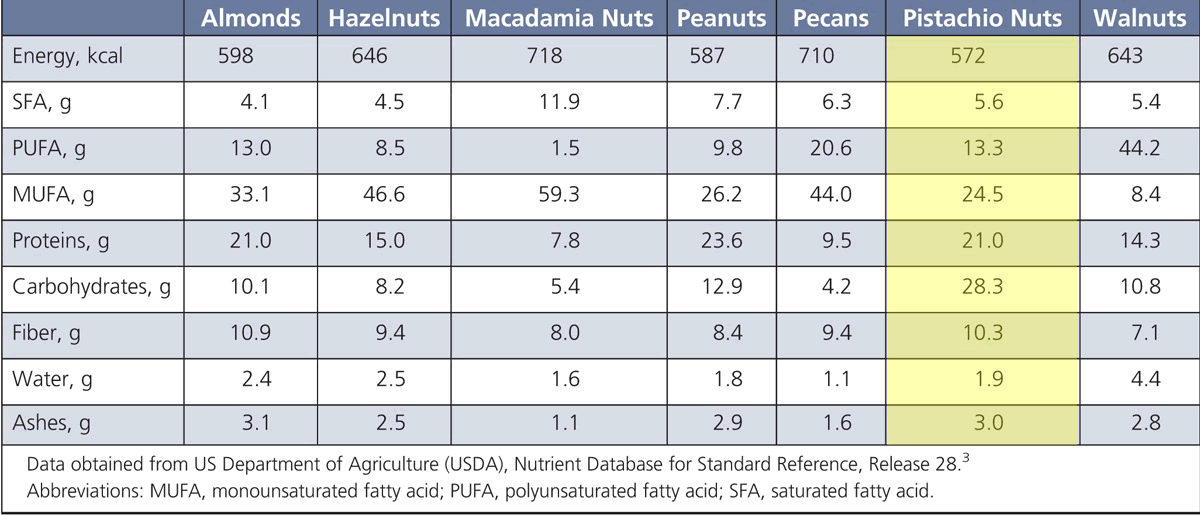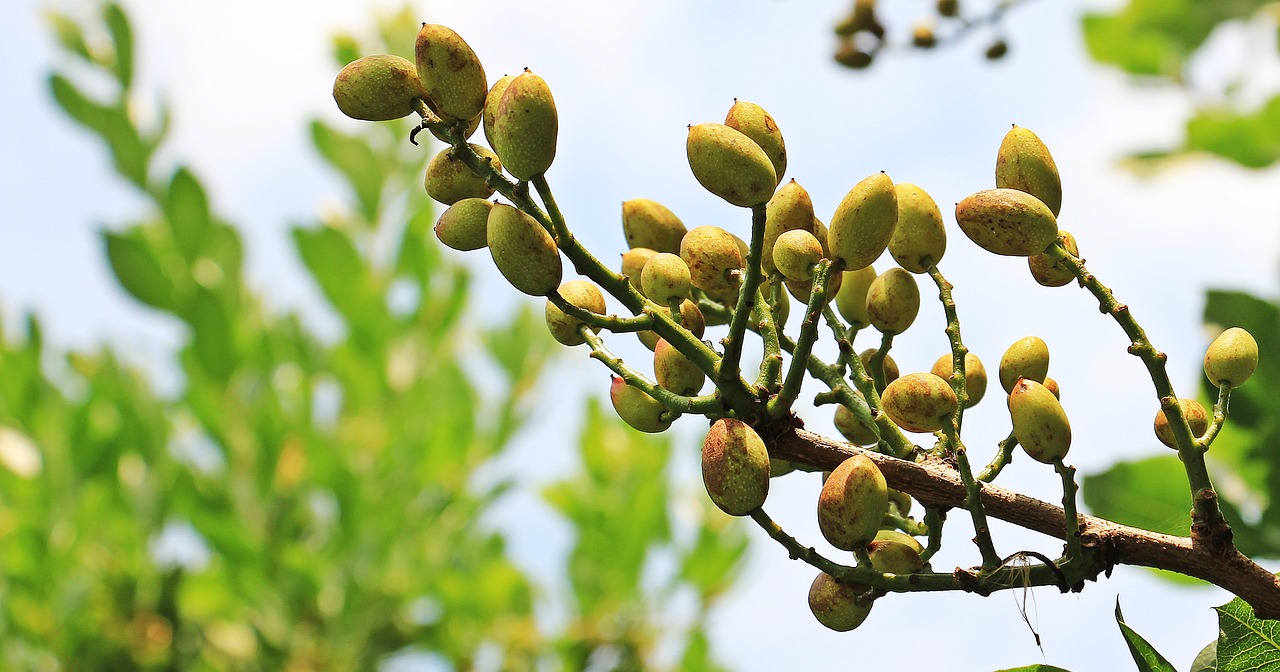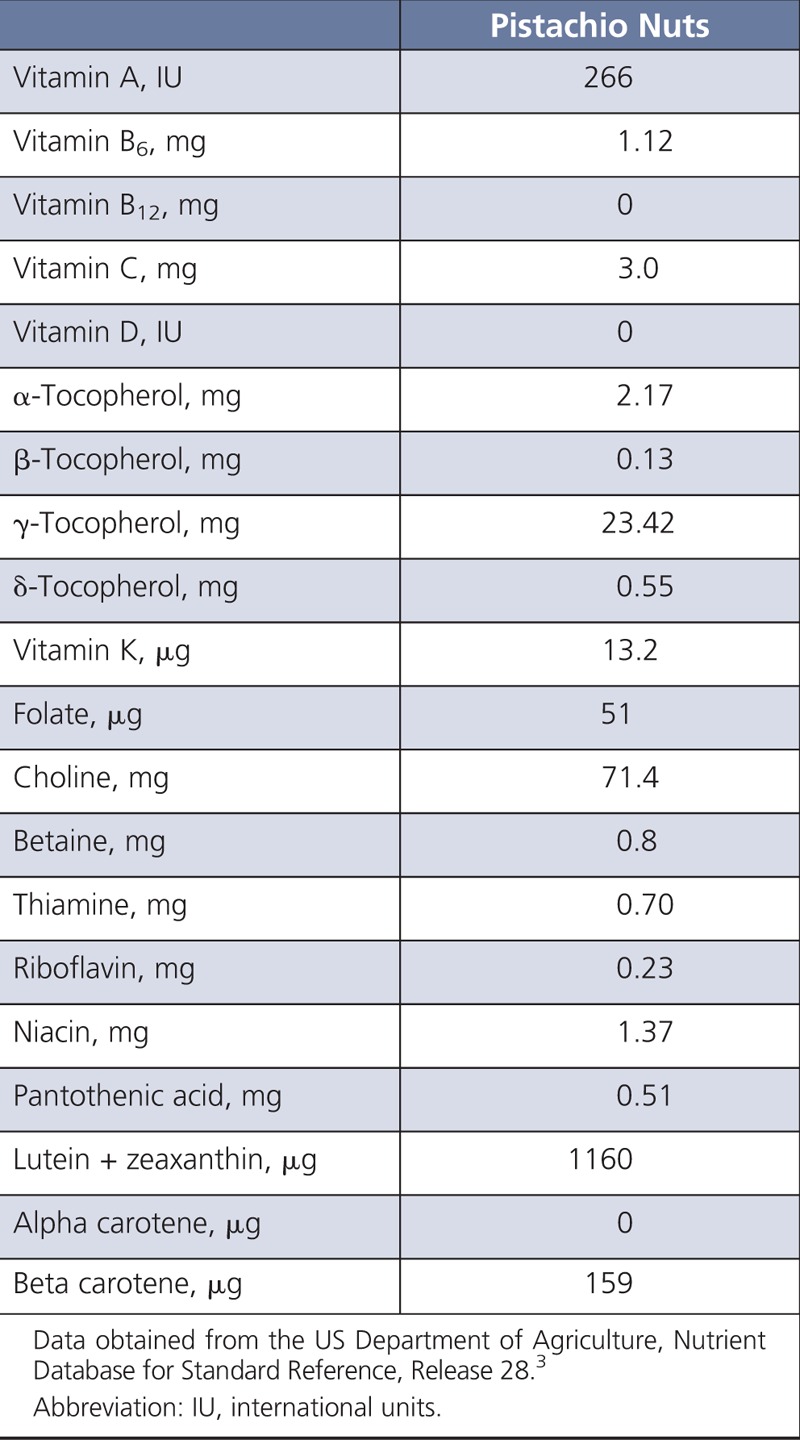Pistachio Health Benefits
Pistachios are a nutrient-rich super food and are packed with a wide range of vitamins, minerals, antioxidants and phytochemicals beneficial to health. They originally grew in the deserts of the Middle East, and the trees need hot summers and cold winters to bear fruit. Pistachios are a good source of vegetable protein which your body breaks down into amino acids. Amino acids are the building blocks used to build and repair.
Numerous studies have shown that pistachios lower the risk of colon cancer. This is because pistachios are rich in health-promoting bioactive compounds such as B vitamins, vitamin E and polyphenols. Pistachios contain lots of dietary fibre, which can decrease the risk of colon cancer. Pistachios should be in everyone's diet, particularly men.

Pistachio Health Summary.
- Very high micro-nutrient content compared to other nuts.
- Packed with anti-oxidants.
- Good anti-inflammatory effects.
- They contain alpha-linoleic acid (ALA), which is the plant version of omega-3.
- Contain significant amounts of essential minerals such as potassium, phosphorus, magnesium, calcium and zinc
- Contain vitamins A, E, C, B, and K.
- They are "slow to eat" compared with other nuts and snacks, as they are usually eaten from their shells, so you tend to eat them slowly.
- Contains the antioxidants lutein and zeaxanthin which are essential for eye health.
- Rich in fibre, which encourages a healthy digestive system and better gut health and reduces the risk of some cancers, such as colon cancer.
- High in vegetable protein.
- Lower the levels of oxidized LDL.
- Lower in calories compared to other nuts.
- Great for children as they help with dexterity and finger strength.
- Provide adequate levels of all nine essential amino acids, with ratios higher than most other nuts.
- They have a high percentage of branched-chain amino acids, BCCAs.
- Helps with sleep.
- Low oxalate levels, making them a good choice for people prone to kidney stones.
- Regularly eating nuts helps with weight loss.
- Important for heart health.
- Help to reduce cholesterol levels and lower blood pressure.
- Have a low glycemic index, so they do not cause a sharp rise in blood sugar.
- Very versatile in a variety of recipes.

Pistachios contain beneficial antioxidants
As our cells grow older, they accumulate oxidative damage caused by free radicals. A class of molecules called antioxidants can sweep up these free radicals and reverse some of the cellular damage. Relative to other nuts, pistachios are a rich source of antioxidants, including lutein, β-carotene, and γ-tocopherol, in addition to containing selenium and flavonoids. As would be expected, pistachios elevate antioxidant levels (study). The pistachio-rich diet significantly affected serum oxidized-LDL, uric acid, lutein, lycopene, zeaxanthin, α-carotene, β-carotene, γ-tocopherol, and α-tocopherol concentrations.
Pistachios and cancer prevention
- In a 2017 study, pistachios were found to lower the risk of colon cancer. This occurs because pistachios are rich in health-promoting bioactive compounds such as B vitamins, γ-tocopherol (a form of vitamin E), polyphenols and dietary fibre. Pistacios were found to not only to help prevent cancer, but also killing cancer cells (promoting apoptosis). Different studies have demonstrated that dietary fibre can decrease risk for colon cancer.
- The Nurses’ Health Study showed an inverse association between nut consumption and pancreatic cancer in women.
- The nuts are a rich source of γ-tocopherol, a form of vitamin E which protects cells from damage that can be caused by molecules known as free radicals. This protection could help prevent cancers such as lung cancers from developing (according to a US study)
- The roasting process had no consistent or diminishing impact on these chemopreventive effects, which is an important finding, since pistachios are often consumed roasted.
Pistachios are a super source of phosphorus
Phosphorus is an essential element required for cells to function. Getting enough phosphorus ensures that your cells can continue to produce energy and it also strengthens your bones. Phosphorus values range from 350-550 mg per 100 g, which are higher than the banana (26 mg), pineapple (8 mg) and strawberries (21 mg). Therefore Pistachios are an excellent phosphorus source for human nutrition (the UK RDA for phosphorous is 550mg).
Pistachios are a good source of magnesium
Magnesium is an important electrolyte used by virtually all of the bodily enzymes. It maintains fluid balance, gives energy to the cells, activates creatine, improves sleep quality, and increases the amount of free testosterone. A 100g serving of pistachios contains 121mg of magnesium, 30% of your RDA.
Pistachios are a super source of potassium
One of potassium’s biggest roles in our bodies is to regulate the amount of sodium entering and exiting our cells, thereby controlling the amount of fluid we retain or excrete. Potassium maintains the body’s pH levels, which ensures that cells function correctly. A 100g serving of pistachios contains a whopping 1,025mg mg of phosphorus, 25% of your RDA (the RDA for potassium is very high and it's difficult to achieve).
Pistachios contain vitamin B6
Failure to get enough vitamin B6 has been associated with elevated risk of cardiovascular disease, certain types of cancer, and cognitive dysfunction. Vitamin B6 helps red blood cells carry oxygen and increase haemoglobin count. Women need 1.5 mg of vitamin B6 per day, while men need 2mg per day. A 100g serving of pistachios contains 1.7 mg of vitamin B6.
Pistachios are low in oxalates
Many vegetables and nuts contain large amounts of compounds called oxalates, which strongly binds to magnesium and calcium. Oxalates can accumulate in the body and cause inflammation and pain, Oxalates also cause kidney stones (calcium oxalate). Pistachios have the lowest oxalate content of all nuts (77 mg /100g, peanuts are 185mg, pine nuts are the worst at 500mg+). So if you are prone to kidney stones or want to reduce your oxalate levels, pistachios are a super choice.
Pistachios are high in Amino Acids
Pistachios provide adequate levels of all nine essential amino acids, (PDCAAS). With an essential amino acid ratio higher than most other commonly consumed nuts, and they have a high percentage of branched-chain amino acids.
Pistachios and gut health
Recent studies have shown that both pistachios and almonds have a potential prebiotic effect - feeding healthy gut bacteria populations such as butyrate-producing protective bacteria. They are also a source of dietary fibre – which is important for a healthy digestive system. Fibre also makes you feel more satiated, feeling fuller for longer.
Pistachios and eye health
Lutein and zeaxanthin give green colour to the nuts and promote eye-health by preventing age-related macular degeneration.
Pistachios and erectile dysfunction
In a small study from Turkey, patients who were put on 100g of daily pistachios showed great improvement, both cholesterol and lipid parameters were improved. The study concluded that after three weeks the men had marked improvements in erectile function and improved cardiovascular health. Antioxidant-rich foods such as pistachios can boost nitric oxide production. Pistachios have lots of both antioxidants and arginine, which may help explain the improvement in blood flow. The arginine in pistachios has a vaso-dilating effect because it converts to nitric oxide in the body. 100g of Pistachios contains 2g of arginine. This is a very high figure as you would need 1.5kg of watermelon to deliver the same amount. Arginine supplements typically contain 0.5-1g.
Preparation
Pistachios can be added to many savoury dishes such as pastas, marinades, and stir-fries as well as a topping for salads, yogurts, and dips. Pistachios have specific micronutrient and bioactive molecules that remain unchanged, even after cooking.



Calcium 110mg (11% RDA)
Iron 4.2mg (23% RDA)
Magnesium 120mg (30% RDA)
Phosphorus 485mg (48% RDA)
Potassium 1045mg (30% RDA)
Zinc 2.3mg (15% RDA)
Copper 1.3mg (66% RDA)
Manganese 1.3mg (64% RDA)
Selenium 9.3mcg (13% RDA)
